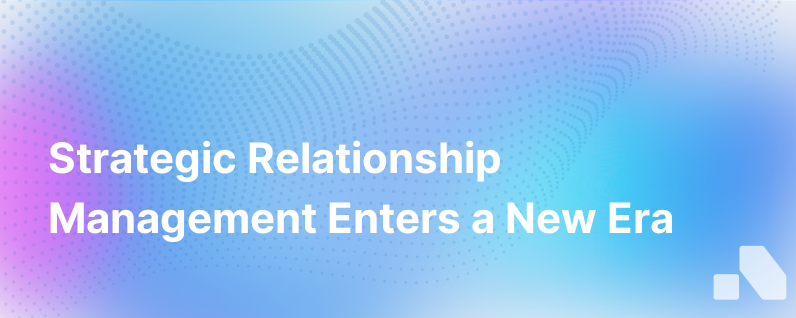
In an ever-evolving B2B landscape, the days of transactional sales are fading, giving rise to a new era — one where Strategic Relationship Management (SRM) reigns. Welcome, indeed, to the fresh epoch of Strategic Relationship Management 2.0.
The essence of SRM is to evolve beyond mere contacts and deals to cultivating deep-rooted partnerships with clients. This approach involves a nuanced understanding of the clients’ long-term goals, challenges, and working frameworks — aligning these with the solutions and value propositions offered. It's a bespoke concerto of trust, collaboration, and proactive problem-solving that echoes through the corridors of successful modern companies.
With the SRM 2.0 paradigm, we observe a shift in focus from the sales-led narratives of yesteryear to more customer-centric stories, echoing their experiences and the journey shared with the provider.
Paradigm Shift: The Transition to a More Holistic SRM Approach
The historical template of client management resembles a reactive model — a company would engage with a client post an issue surfacing or at scheduled intervals. These touchpoints, while functional, rarely dug beneath the surface to truly align with client aspirations or to pre-empt potential challenges.
However, SRM 2.0 champions a proactive strategy. It champions ongoing engagement, where open lines of communication facilitate a continuous exchange of insights, feedback, and strategic assistance. Resultantly, this drastically reduces the likelihood of challenges becoming full-blown issues and enhances the ability to capitalize on emerging opportunities.
Incorporating Technology and AI for Deeper Insights
SRM 2.0 is no longer reliant on the human component alone. With the advent of advanced CRM systems, social listening tools, and AI-powered platforms like Aomni, businesses can now understand their clients with unprecedented clarity. These technologies enable the harvesting of real-time data and predictive analytics to not only respond to current client needs but to also anticipate future demands.
The Emergence of Multi-dimensional Collaboration
Gone are the days of siloed departments having intermittent interactions with clients. SRM 2.0 promotes a multi-disciplinary approach — sales, service, product, and even leadership teams engaging collectively with clients to provide all-encompassing support and nurture a robust partnership ecosystem. This paradigm ensures all facets of your business are aligned with client success.
Educating and Advising as the New Selling
"Selling" in the traditional sense is being substituted by educating and advising, operating from the standpoint that informed clients make better partners. SRM 2.0 empowers clients with knowledge, making them collaborators in the sales process. This transformation positions providers as trusted advisors — elevating the relationship from vendor status to strategic partner.
Long-term Commitment and Shared Success
Finally, SRM 2.0 places immense value on enduring partnerships that witness shared trials, triumphs, and growth over time. It's no longer a win-lose scenario but rather a cohesive journey towards mutual success. Providers that embrace this approach will find themselves with a portfolio of loyal clients who view their success as intrinsically linked to that of their trusted provider.
Elements of Strategic Relationship Management 2.0
To navigate this new era of SRM, certain key elements come to play. They serve as both foundational pillars and guiding principles for managing and nurturing strategic customer relationships.
Customer-Centered Culture
To practice SRM 2.0 effectively, a shift in corporate culture towards customer centricity is necessary. Employees at every level should understand and appreciate the value of customer relationships, ensuring that each interaction reflects the business's commitment to its clients.
Active Listening and Empathy
Engagement through active listening and empathy forms the heart of any relationship. SRM 2.0 puts a heavy emphasis on genuinely understanding clients' needs and challenges, and addressing those with solutions that resonate on a personal and business level.
Value over Volume
Instead of pushing products, SRM 2.0 centers on delivering value through service, expertise, and problem-solving. Every recommendation or solution offered should be based on adding tangible value to the client's business operation.
Collaboration and Co-creation
Working alongside clients to develop solutions is a hallmark of deep strategic relationships. Providers that engage clients in the co-creation process often find better adoption rates, greater satisfaction, and increased opportunities for up-selling or cross-selling.
Long-term Focus
Metrics and compensation models in SRM 2.0 should reflect a long-term view, favoring sustained engagement and growth over short-term gains. Rewarding teams for client loyalty, repeat business, and customer satisfaction reinforces a long-term strategic approach.
Technology Integration
Achieving the ideals of SRM 2.0 is undergirded by technology. The use of advanced CRMs and platforms like Aomni to gather, analyze, and utilize data for personalized client interactions is crucial to maintaining relevant and informed relationships.
Agility and Flexibility
Lastly, SRM 2.0 requires a degree of agility, as the B2B landscape is constantly shifting. Having the flexibility to pivot approaches rapidly as per the changing dynamics of a client's business environment is invaluable.
In Practice: SRM 2.0 at Aomni
At Aomni, SRM 2.0 is not mere theory. We practice what we preach. Aomni's AI platform is a paradigm shift that empowers B2B sales teams to sell more strategically. Our system equips your team with real-time account research, competitive insights, and personalized sales content — all with zero effort required. We understand the importance of strategic relationships in fueling business growth and tailoring solutions that fit perfectly with your client's evolving landscape.
In closing, the new era of SRM demands more than just business acumen—it calls for a dynamic mix of empathy, expertise, and genuine partnership. It's an exciting time, as these deepened strategic relationships not only yield better business results but also forge more meaningful connections in the professional world. Welcome to SRM 2.0, an era where relationships, strategy, and technology converge to drive success in the modern business narrative.